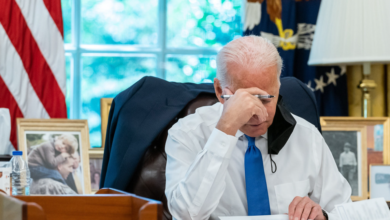Could Syria be another intervention to no-where?
As many as ten thousand people have been killed since the uprising against Syrian President Bashar-al Assad began roughly 14 months ago. But the newly discovered massacre in the village of Houla this past weekend could be a game changer. It unleashed some of the worst violence yet, killing over a hundred people and sparking international outrage. In a uniform show of protest nations across the world, including the United States, expelled Syrian diplomats.
Who actually carried out the massacre is unknown, but as the death toll rises, pressure to take more action builds. From the campaign trail in tones reminiscent of “Dubya”, Romney is calling “for more assertive measures to end the Assad regime.” On the Hill, Senator McCain has criticized the President’s “feckless foreign policy” for punting on Syria. On the Left, UN Ambassador Rice, after months of tabling the military option, now believes the international community may have to take “action outside” the failed UN peace plan. Anxious to stay in the public eye, Secretary of State Clinton entered the fray this week insisting that with each passing day the case for military intervention looks stronger.
Sadly, despite the series of disastrous, self-defeating interventions over the last twenty years from Somalia and Haiti to Iraq and Afghanistan, most inside the US government are convinced American military power is always the “global force for good,” regardless of the outcome. The idea that US national interests are not furthered by more interventions in the Middle East or anywhere else in the third world does not seem to matter. It’s time America’s warmongering policymakers took a short trek down memory lane.
The list of botched US overseas missions is long, ignominious, and tragically for many, not memorable. It includes America’s bungled operation in Somalia in 1993, when a humanitarian intervention to referee a civil war Somalia is still fighting degenerated into urban combat, killing over a thousand Somalis, 18 US troops, and resulting in public embarrassment for the United States.
Our foolishness continued in the Balkans in the mid-nineties. Under the NATO umbrella US forces intervened in Bosnia to stop ethnic cleansing and build democracy. So we deployed peace keeping troops, bombed the Serbs, and tried Slobodan Milosevic for war crimes. Thanks to our efforts, Douglas Hague, the British Foreign Minister warns Bosnia is on the brink of relapsing into chaos and ethnic conflict.
Haiti makes the list too. Remember the mission to Haiti in 1994? “Operation Uphold Democracy” was just one of many US humanitarian missions to establish order in a country with no fire department. Again the results are similar, Haiti remains the same as it was before we intervened –backward, poverty stricken, and systemically corrupt.
For the moment, however, US interventions are focused on the Middle East, a region rapidly succumbing to Islamist rule aided in some measure by US air power, armaments, and no fly zones. Here too, America’s abysmal record hasn’t deterred us. US occupations in Iraq and Afghanistan set the bar high in terms of wasting US blood and treasure, inciting hatred against America, and leaving countries in worse shape than we found them.
After occupying Afghanistan for over a decade, the US is so unpopular amongst the local population that aid packages are stripped of any US markings to ensure Afghans will actually accept them. US military advisors training the Afghan army are constantly on alert, fearing that the people they are training may instantly turn and kill them. Just a few months ago US forces came under attack across the country and angry mobs gathered in Afghanistan’s capital, Kabul, to vent their rage after US troops burned already defiled copies of the Quran.
The US debacle in Iraq is only just now beginning to materialize. After installing a “democratic” government in Baghdad, Iraqi Prime Minister Nouri al-Maliki thanked us for our efforts and said goodbye, rejecting the Obama Administration’s request to permanently station several thousand US troops in the country. With US forces completely out of the picture, Maliki and the Shia population he represents have consolidated control of the government, making Iraq ripe for civil war and extending the Iranian sphere of influence at the same time.
Fortunately, since the Arab Spring began last year the US has refined its involvement in mid-east affairs, now focusing on replacing secular authoritarian regimes with Islamist ones. Let’s recount some recent events.
First, it was Egyptian President Mubarak who had to go – so we sided with the protesters in Tahrir Square and encouraged democratic elections, putting the Muslim Brotherhood in charge. Next came Libya, but this required more direct action. Leading an international coalition, US air power set up a no fly zone and bombed Muammar Gaddafi’s forces into submission. Victory was secured when rebel forces reclaimed the capital Tripoli, killed Gaddafi, and declared Libya an Islamic state governed by Sharia Law.
Now US attentions are fixed on Syria. The interventionist drum beat began months ago when the usual bi-partisan coalition of the willing to bomb anyone, anywhere, anytime, for any reason, consisting of Senators John McCain, Lindsey Graham, and Joe Lieberman, called for direct US involvement.
McCain said that assuming Assad would ultimately be overthrown is a “convenient way to abdicate responsibility.” Responsibility to do what exactly? McCain’s answer – launch air strikes or arm the rebel opposition. Of course, who the opposition is and what US forces would achieve by intervening on their behalf are questions that go unanswered, but these are trivialities that don’t concern McCain’s triumvirate.
This brings us to the most important question –after all of these ruinous interventions under our belt and no sign we are letting up what is the end game? When will the interventions to no-where stop? Will interventionist supporters be content when the Middle East is dominated by democratically elected anti-Western Islamist governments? Will they rejoice when Assad’s regime is ousted, an outcome that will almost certainly plunge Syria into a full blown sectarian civil war?
Or will sober minded Americans remember that America is a republic not an empire, and compel Washington to invest in America, a country fast resembling the failed states we are desperately trying to fix?
Cameron Macgregor is a former naval officer and USNA graduate. He is writing his first book, America Resurrected.




